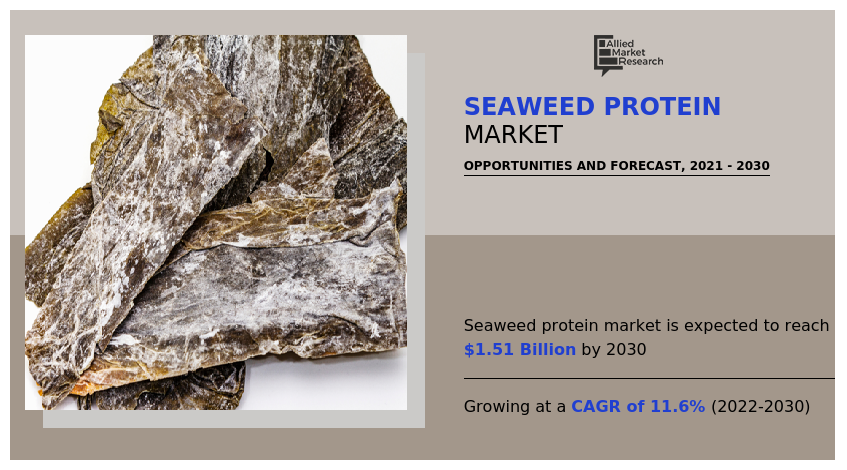Increasing prevalence of Plant-based Protein in the Food Industry to Drive the Market Growth.
The seaweed protein market was valued at $550.40 million in 2021, and is estimated to reach $1.51 billion by 2030, growing at a CAGR of 11.6% from 2022 to 2030.
Request Free Sample Report: https://www.alliedmarketresearch.com/request-sample/17272
Proline, glycine, alanine, glutamic, arginine, and aspartic acids are among the amino acids present in seaweed protein. These amino acids are beneficial for human health. According to research, red seaweeds have a high protein content, green seaweeds have a moderate protein content, and brown seaweeds have a low protein content. Seaweed protein is gaining demand as a more cost-effective and alternative source of protein for human and animal nutrition. The seaweed protein market growth is being aided by an increase in the occurrence of health diseases, increased understanding of healthy eating habits, and an increase in health and fitness awareness. Consumers are more conscious regarding their nutritional consumption, benefits of physical activity, and importance of eating food that suits the body’s nutritional needs. These trends are anticipated to boost revenue growth the seaweed protein market size in the upcoming years.
Seaweed protein is mostly used in animal feed due to nutrients included in it such as vitamin A, B1, B2, E, K, and C. Consuming seaweeds such as spirulina and chlorella, contain all of the essential amino acids. Moreover, seaweed ensures that consumer gets full range of amino acids. Seaweed can also act as a good source of omega-3 fats. It is used in the development of aquaculture feed, monogastric cattle feed, ruminant feed, and others. Cattle’s overall health and growth rate is improved as a result of consuming seaweed protein. Development of this market is fuelled by increased livestock industrialization, rising meat consumption, and increased need for nutritious feed.
For Purchase Enquiry: https://www.alliedmarketresearch.com/purchase-enquiry/17272
Seaweed farming is more expensive than land farming, which is projected to hinder the global market expansion. Also, excessive consumption of seaweed can cause health problems due to presence of toxic minerals. Therefore, all such factors are anticipated to hamper the seaweed protein market share during the forecast period.
Increased use of seaweed in dietary supplements due to its nutritional worth, flavor-enhancing capabilities, and weight-loss properties has driven seaweed protein demand. Seaweeds also have a high concentration of bioactive compounds, antioxidants, and antibacterial properties, making them appropriate for a number of medicinal uses. In addition, new uses for seaweed have raised demand in recent years. In the textile business, it is used as a thickener, and in agriculture, it is used to improve soil quality. the above mentioned factors are anticipated to propell the seaweed protein market opportunities over the forecast period.
The market is segmented on the basis of type, application, and region. By type, the market is classified as red, brown, and green. By application, it is classified as food, animal feed & additives, cosmetics & personal care, and others. By region, the market is analyzed across North America, Europe, Asia-Pacific, and LAMEA.
Buy Now and Get Discount: https://www.alliedmarketresearch.com/checkout-final/0d6292fb8d2149cf75875b831b97fd5d
The key players profiled in the seaweed protein market include CP Kelco, Cargill, Incorporated, Qingdao Gather Great Ocean Algae Industry Group CO. LTD, Mara Seaweed, ASL, Irish Seaweeds, AtSeaNova, ALGAIA, Seasol, and Maine Coast Sea Vegetables.
Impact of COVID-19 on the Global Seaweed Protein Industry
The COVID-19 pandemic had a negative impact on the global market. Due to increasing prevalence of coronavirus, several industries including agriculture, food, and others were completely closed. As of result of this, demand for seaweed protein was significantly reduced. The market has faced a negative impact during the epidemic.
COVID-19 hampered industrial processes and disrupted the supply chain, affecting almost every industry. Due to a lack of workers, most businesses had ceased operations during the pandemic. As a result of COVID-19’s impact on the global seaweed protein market demand was reduced significantly.
COVID-19 had a lower impact on certain countries such as Japan, due to people’s lifestyles and food patterns, which included a seaweed-rich diet. Seaweed consumption provides a variety of nutrients such as proteins, minerals, carbohydrates, water, and iodine. It also acts as an anti-inflammatory, antiviral, and antioxidant, and has prebiotic properties. According to the aforementioned considerations and analyses, the pandemic could create significant investment opportunities and seaweed protein market trends in the near future.
About Allied Market Research:
Allied Market Research (AMR) is a full-service market research and business-consulting wing of Allied Analytics LLP based in Portland, Oregon. Allied Market Research provides global enterprises as well as medium and small businesses with unmatched quality of “Market Research Reports” and “Business Intelligence Solutions.” AMR has a targeted view to provide business insights and consulting to assist its clients to make strategic business decisions and achieve sustainable growth in their respective market domains. AMR offers its services across 11 industry verticals including Life Sciences, Consumer Goods, Materials & Chemicals, Construction & Manufacturing, Food & Beverages, Energy & Power, Semiconductor & Electronics, Automotive & Transportation, ICT & Media, Aerospace & Defense, and BFSI.
We are in professional corporate relations with various companies and this helps us in digging out market data that helps us generate accurate research data tables and confirms utmost accuracy in our market forecasting. Each and every data presented in the reports published by us is extracted through primary interviews with top officials from leading companies of domain concerned. Our secondary data procurement methodology includes deep online and offline research and discussion with knowledgeable professionals and analysts in the industry.
